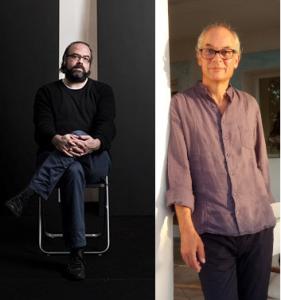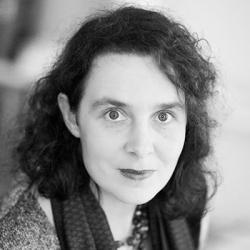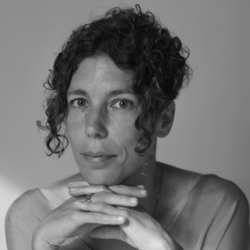Ari Benjamin Meyers & Peter Szendy. À bout de souffle / Breathless
Workshop
Ari Benjamin Meyers & Peter Szendy. À bout de souffle / Breathless
Dernière séance du séminaire « Comment exposer la polyphonie ? » avec l’artiste Ari Benjamin Meyers et le philosophe et musicologue Peter Szendy
La rencontre entre l’artiste Ari Benjamin Meyers et le philosophe et musicologue Peter Szendy, accompagnée par une lecture du traducteur et dramaturge Jean Torrent, fait partie du séminaire « Comment exposer la polyphonie ? ». Organisé au DFK Paris par Mathilde Arnoux (directrice de recherche au DFK Paris) et Anne Zeitz (maître de conférences en Arts plastiques à l’Université Rennes 2), ce séminaire a fortement contribué à l’élaboration conceptuelle et théorique de l’exposition « Polyphon(e). Polyphonies visuelles et sonores / Mehrstimmigkeit in Bild und Ton ». Quatre premières séances avaient précédé l’inauguration de l’exposition à Gera (Museum für Angewandte Kunst et Kunstsammlung Gera – Orangerie, 2 juillet au 19 septembre 2021), puis quatre autres ont été organisées le temps de l’ouverture du deuxième volet de l’exposition à Saint-Denis (Musée d’art et d’histoire Paul Éluard, 20 mai au 7 novembre 2022). Cette dernière séance avec Ari Benjamin Meyers et Peter Szendy, dont les écrits n’ont cessé de nourrir nos questionnements au fil des rencontres, nous permet d’envisager une fin au cycle « Comment exposer la polyphonie ? », qui a démarré en mars 2021, sans pour autant clore nos réflexions.
Ari Benjamin Meyers a cheminé aux côtés du séminaire « Comment exposer la polyphonie ? » depuis le début, notamment à travers des présentations de projets performatifs comme Duet, montré dans l’exposition « Polyphon(e) », et La Musique n’est pas…, réalisé avec les étudiants de l’Université Rennes 2, puis une rencontre au musée de Saint-Denis autour de Forecast, œuvre théâtrale et musicale à grande échelle. Nous reviendrons dans cette séance sur la version filmée de Forecast (partie 1) qui explore les phénomènes météorologiques et le changement climatique et en fait le point de départ d’une méditation sur la prévisibilité et l’idée que l’humanité, avec son besoin de pronostic et de progrès, est un inventeur de l’avenir. Conçue comme un examen des crises contemporaines et de leur imprévisibilité, la pièce n’a pu être accomplie telle qu’elle avait été initialement conçue, interrompue par la pandémie en 2020. Avec deux actrices, sept musiciens et une équipe de machinistes de la Volksbühne de Berlin, Ari Benjamin Meyers a finalement réalisé une version filmée de la performance sous la forme d’une série de cinq courts métrages, produite en mars 2021. Depuis, le texte allemand de la première partie a été traduit en français par Jean Torrent et publié sur AOC et une version performée en anglais de la première partie avec un acteur et trois guitaristes sera présentée au MUDAM de Luxembourg en juillet et au Kunstmuseum Liechtenstein en octobre 2023. Nos dernières discussions autour de Forecast ont surtout porté sur la voix, en particulier celle de l’actrice qui lit le texte de la première partie, de manière urgente et essoufflée, luttant avec le son et le rythme des instruments qui l’accompagnent. Dans le dernier projet d’Ari Benjamin Meyers, la performance UNLESS dans le cadre de Paysages partagés, initiés par le Théâtre Vidy-Lausanne et Rimini Protokoll, sept artistes ont été invités à intervenir à l’extérieur, entre champs et forêts. Le tout dernier moment de cette production d’une journée est la partie finale de UNLESS intitulée « …for the Air » : les musiciens courent à toute allure vers le public, une fois arrivés à bout de souffle, ils commencent à interpréter la partition. En plus de regarder la partie 1 de Forecast, nous écouterons la lecture d’un extrait de la traduction française par Jean Torrent et discuterons de la relation entre les deux projets qui ont évolué, et évoluent toujours, de manière complémentaire.
Nous poursuivrons les échanges avec Peter Szendy, philosophe et musicologue, professeur de littérature comparée à Brown University (Providence, RI), qui dans ses recherches actuelles, elles aussi présentées sur AOC, interroge les possibilités d’un « souffle commun ». Il aborde le sujet de manière littéraire et philosophique, en explorant toute une série de textes qui parlent du souffle partagé et qui vont de Cicéron à Jacques Lacan en passant par Hermann Broch, Elias Canetti ou Frantz Fanon. Partant du sens enfoui du terme conspiration, il révèle les dimensions à la fois cosmologique et politique du fait de « respirer ensemble ». Le souffle offre à Szendy l’occasion de penser les vulnérabilités ensemble avec la finitude et d’ouvrir à une réflexion socio-politique sur l’essoufflement. Réciprocité et partage sont au cœur de son approche, déjà engagées dans ses précédentes recherches. Ses ouvrages, notamment Écoute. Une histoire de nos oreilles (2001), Sur écoute. Esthétique de l’espionnage (2007) et Pouvoirs de la lecture. De Platon au livre électronique (2022), prêtent une attention particulière aux fragilités, incertitudes et fluctuations qui participent des rapports entre destinateurs et destinataires de ces actes si discrets que sont l’écoute ou la lecture.
English:
Last workshop of the seminar “Exhibiting Polyphony” with artist Ari Benjamin Meyers and philosopher and musicologist Peter Szendy
The encounter between artist Ari Benjamin Meyers and philosopher and musicologist Peter Szendy, with a reading out loud by translator and dramatist Jean Torrent, is part of the seminar “Exhibiting Polyphony”. Organised at the DFK Paris by Mathilde Arnoux (research director at the DFK Paris) and Anne Zeitz (lecturer in Visual Arts at Université Rennes 2), this seminar was part of the conceptual and theoretical formulation of the exhibition “Polyphon(e). Polyphonies visuelles et sonores / Mehrstimmigkeit in Bild und Ton”. Four workshops preceded the opening in Gera (Museum für Angewandte Kunst and Kunstsammlung Gera – Orangerie, 2 July to 19 September 2021). Four others have then been organised during the second part in Saint-Denis (Musée d’art et d’histoire Paul Éluard, 20 May to 7 November 2022). This last session with Ari Benjamin Meyers and Peter Szendy, whose writings have constantly accompanied our questioning throughout the seminars, allows us to envisage an end to the cycle “Exhibiting Polyphony”, which began in March 2021, without bringing our reflections to a standstill.
Ari Benjamin Meyers has been accompanying the seminar “Exhibiting Polyphony” since the beginning, having presented performative projects such as Duet, shown in the exhibition “Polyphon(e)”, and La Musique n’est pas…, realized with students of the university of Rennes, followed by a session around his large-scale music-theater work Forecast at the museum of Saint-Denis. In this session, we will return to a film version of Forecast (Part 1) and watch it again. The piece explores meteorological phenomena and climate change as the starting point for a meditation on predictability and the idea that humanity, with its need for progress and prognosis, is an inventor of the future. Conceived as an examination of contemporary crises and their inherent unpredictability, the piece could not be completed as originally planned, interrupted by the pandemic in 2020. With two actresses, seven musicians and a team of stagehands from the Berlin Volksbühne, Ari Benjamin Meyers finally produced a version of the performance as a series of five short films in March 2021. Since then, the German text of the first part has been translated to French by Jean Torrent and published on AOC and an English performance version of Part 1 with one actor and three guitarists will be presented at MUDAM in Luxembourg in July and in Kunstmuseum Liechtenstein in October 2023. Our last discussions around Forecast focused mainly on the voice, particularly that of the actress who reads the text of the first part. She does so urgently and breathlessly, struggling with the sound and rhythm of the instruments accompanying her. In Ari Benjamin Meyers’ newest project, a performance entitled UNLESS within the framework of Shared Landscapes, initiated by Théâtre Vidy-Lausanne and Rimini Protokoll, seven artists were asked to create performances for the outdoors between fields and forests. The very last moment of the day-long production is the final part of UNLESS entitled “…for the Air” and involves the musicians running towards the audience at full speed, who only then, upon arrival and completely out of breath, start interpreting the score. Besides the recording of Forecast, we will listen to a reading of an extract of the French translation by Jean Torrent and discuss the ongoing dimension of the two projects that have been evolving, and still are, in a complementary way.
We will continue our exchanges with Peter Szendy, philosopher and musicologist, Professor of Comparative Literature and Humanities at Brown University, who in his current research questions the possibilities of a “common breath”, a reflexion which is presented on AOC as well. He addresses the topic in a literary and philosophical way, exploring a whole series of texts that refer to a shared breath and that go from Cicéron and Jacques Lacan to Hermann Broch, Elias Canetti and Frantz Fanon. Starting from the embedded meaning of the term conspiracy, he reveals both the cosmological and political dimensions of “breathing together”. Breathing offers Szendy the opportunity to think about vulnerabilities together with finitude and to open up a socio-political reflection on breathlessness. Reciprocity and sharing are at the heart of his approach, already engaged in his previous research. His published works as Listen. A History of Our Ears (2008), All Ears: The Aesthetics of Espionage (2016) and Pouvoirs de la lecture. De Platon au livre électronique (2022) pay particular attention to the fragilities, uncertainties and fluctuations that participate in the relationship between addressers and recipients during the fragile acts of listening or reading.
Beteiligte Kolleg:innen des DFK Paris






